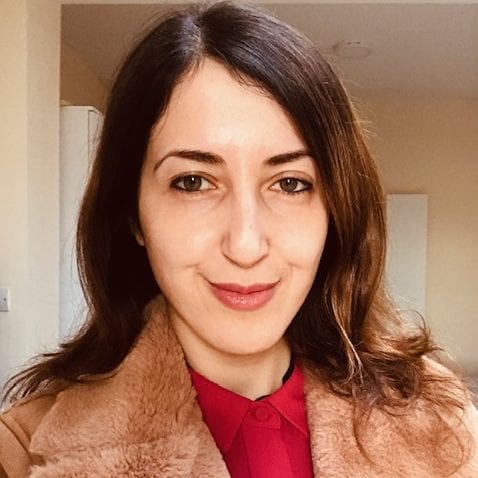In this ethnographic study, French-Iraqi sociologist Zahra Ali embarks on a unique journey, capturing the voices of Iraqi women of all ages, religions and political persuasions to get a first-hand account of life in Iraq from a woman’s point of view. The book relies on two years of intensive field work mainly in Baghdad, and secondarily in Erbil and Sulaymaniyah in Iraqi Kurdistan between 2010 and 2012. Ali also conducted shorter field work studies in Najaf-Kufa, Karbala and Nasiriyah in 2013, 2016 and 2017.
As a second-generation migrant, Ali was in a unique position when conducting her research. In Iraq, she was able to live with her own family members who never left the country and was able to travel around Baghdad with the ease of an Iraqi national due to one of her relatives being a taxi driver. In a country plagued by many dangers, Ali’s long stay, let alone her in-depth ethnographic research was groundbreaking for Iraqi women. “Many of my interviewees expressed feelings of being ‘stuck’ in and ‘suffocated’ by a city of walls, separations and checkpoints,” she explains. “I was also told that they were even happier that my research would also be accessible to the ‘outside world’.”
Keeping in line with prominent Iraq historian Charles Tripp, Ali emphasises the importance of a historical perspective when it comes to understanding Iraqis’ material circumstances and how they have a direct impact on societal values. This historical perspective, or historicity, is often omitted by the mainstream media, particularly when trying to understand the surge in violence from Daesh extremists. “The unspeakable violence faced by women under [Daesh],” she argues, “cannot be understood without considering the continuum of structural violence occurring in Iraq since at least the 1980s, through militarisation, harsh patrimonial authoritarianism, devastating economic sanctions, and the US-led military invasion and occupation that have exacerbated ethno-sectarian, social and political tensions.”
REVIEW: Political Quietism in Islam: Sunni and Shi’i Practice and Thought
Ali looks into the history of Iraq as far back as British colonial rule in the early 20th century. The new government under the British mandate introduced a constitution that did not give all people the same legal rights. “The dominant trend of British politics under the mandate and in the following years of the monarchy…was to emphasise the ‘different needs’ of Iraqi society and establish a differentiated legal system in which citizens were granted different ‘rights’ according to their religious and sectarian belonging as well as to their location and gender. Differences existed among women: Muslim and Christian women were not granted the same rights regarding personal matters, neither Sunni nor Shia, and the gap was even stronger between rural and urban women.”
It was only after the British mandate ended that religious and sectarian divisions weakened. During the revolutionary period under Abdul Karim Qasim (1958-1963), a unified family law was introduced which applied to all citizens regardless of their religion. Not until the 2003 invasion and occupation of Iraq were divisive laws, similar to those of the British mandate era, re-introduced into the country. The Coalition Provisional Authority (CPA) attempted to bring politicised sectarianism into the home via changes to family law through the controversial article 41 of the 2005 Iraqi constitution. This set out that different ethnic, sectarian and religious groups could be governed by separate laws in family legal matters like marriage and divorce.
A prominent women’s rights activist from the non-politically affiliated Al-Rafidain Women’s Coalition expressed her thoughts to Ali quite candidly: “Perhaps there, in America, their society is divided into communities, and each community does not mix with the other community and has its own laws. Here, in our society, it is different. We are a fusion of cultures, a Muslim marries a Christian, we get married between different communities, Sunnis and Shias. Such a law will divide our families, our people.”
According to Iraqi civil rights groups, the rise of Daesh was the result of an acceleration in sectarian tensions that came about after the CPA’s attempts to enshrine sectarianism in law.
One prominent Shia representative at the Baghdad provincial council spoke of her frustrations to Ali: “Before the fall didn’t we all live together, Sunnis and Shias, all neighbours? I am a Shia from Medinat Al-Sadr, and the wife of my maternal uncle is Sunni. Before it was normal. When the militias began to expel Sunnis from Medinat Al-Sadr, my family and I did not give any names, not one Sunni name… But this was not the case for everyone, some people were under pressure; they felt pressure from foreign agendas, but I do not consider these people Iraqis or even Muslim.”
REVIEW: Israel, Palestine and the Politics of Race
In spite of everything, Ali encountered a strong spirit of resistance and determination from the women she interviewed. Although completely powerless, the women exercised what agency they had left in the fullest sense possible: some refused American funding on principle, despite being in dire material need of it, and all of the women risked life and limb simply by choosing to stay and be activists in one of the most dangerous countries in the world.
Whatever background they were from, most of the women had a strong sense of pride in their national identity, specifically as it related to the narrative of a past that preceded the US invasion of Iraq and the authoritarian rule of the Ba’ath Party. This golden era provided a collective vision for many of the women activists, regardless of their political persuasion.
Ali’s study unearths a unique women’s movement through which women are creating a narrative that is not only central to their own survival but central to the survival of the land we call Iraq.









